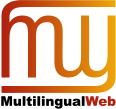Monthly Archives: June 2015
Posts
Linguistic Linked Data in selected domains: 5th and 6th LIDER Roadmapping Workshops to be held in July 2015

For both workshops participation is limited. If you are interested in the Rome event please contact Tiziano Flati, for Munich please contact Philipp Cimiano.
Announcing The Unicode® Standard, Version 8.0
Version 8.0 of the Unicode Standard is now available. It includes 41 new emoji characters (including five modifiers for diversity), 5,771 new ideographs for Chinese, Japanese, and Korean, the new Georgian lari currency symbol, and 86 lowercase Cherokee syllables. It also adds letters to existing scripts to support Arwi (the Tamil language written in the Arabic script), the Ik language in Uganda, Kulango in the Côte d’Ivoire, and other languages of Africa. In total, this version adds 7,716 new characters and six new scripts. For full details on Version 8.0, see Unicode 8.0.
The first version of Unicode Technical Report #51, Unicode Emoji is being released at the same time. That document describes the new emoji characters. It provides design guidelines and data for improving emoji interoperability across platforms, gives background information about emoji symbols, and describes how they are selected for inclusion in the Unicode Standard. The data is used to support emoji characters in implementations, specifying which symbols are commonly displayed as emoji, how the new skin-tone modifiers work, and how composite emoji can be formed with joiners. The Unicode website now supplies charts of emoji characters, showing vendor variations and providing other useful information.
Some of the changes in Version 8.0 and associated Unicode technical standards may require modifications in implementations. For more information, see Unicode 8.0 Migration and the migration sections of UTS #10, UTS #39, and UTS #46.
Provide input to the planning of the Big Data Value Chain: Contribute to BDVA Summit 18-19 June, Madrid
In the context of the Big Data Value Association Madrid Summit, 17-19th June, there are two sessions of specific relevance to standards and also to multilingualism: on 18th June a session on standardization, and on 19th June a session on Multilingual Data Value Chains. If you want to have an active participation in both sessions or want to provide further feedback, please contact Felix Sasaki <fsasaki@w3.org> on Standardization and Asun Gomez-Perez <asun@fi.upm.es> on Multilingual Data Value Chains. Presentation will be short in order to promote a wide participation.
If you cannot be in Madrid please also provide your input – see above session links for further instructions. The BDVA Summit will be crucial in shaping upcoming funding opportunities related to Big Data. Don’t miss the chance to describe your views on opportunities, challenges and potential solutions for the Big Data Value Chain!
Updated articles: Working with language in HTML; Creating HTML Pages in Arabic, Hebrew and Other Right-to-left Scripts
Lists of referenced article contents were removed from both the language tutorial and the bidi tutorial to make it easier to keep the page up to date. The note about HTML5 not being stable was also removed. ‘(tutorial)’ was added to the title of the documents.
Updated article: Handling character encodings in HTML and CSS
The paragraph about CSS encoding declarations in the “In a nutshell” section was changed from:
“Use the @charset rule for external style sheets (but not CSS in your HTML page) if you have non-ASCII content, such as font names, ids or class names, etc.”
to
“You can use @charset or HTTP headers to declare the encoding of your style sheet, but you only need to do so if your style sheet contains non-ASCII characters and, for some reason, you can’t rely on the encoding of the HTML and the associated style sheet to be the same.”
Update 3 June:
Additional changes were made throughout the page. In particular, lists of article content were removed to make it easier to keep the tutorial page up to date.
W3C® liability, trademark and permissive license rules apply.
Questions or comments? ishida@w3.org